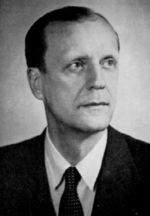羅格納·納克斯
出自 MBA智库百科(https://wiki.mbalib.com/)
目錄 |
羅格納·納克斯(Ragnar Nurkse,1907-1959年)出生於愛沙尼亞。在20世紀30年代早期他全家移居加拿大,他曾在愛丁堡大學和維也納大學學習。作為國際聯盟的一名職員,他發表了幾篇關於國際經濟學方面的非常著名的研究論文。第二次世界大戰之後,他接受了哥倫比亞大學的教授職位並且一直呆在那兒,直到他在度假時在日內瓦過早地去世。
納克斯重新強調了外部經濟的重要性:所進行的投資越多,每項投資也就變得更加可行。因此,低收入經濟要求一個寬廣層面上的進步,與此同時伴隨著相互支持並能增加成功機會的產業擴張。巨大的困難在於這些國家的貧困限制了他們的資本形成。他還提出了“貧困惡性迴圈論”。
納克斯貧困惡性迴圈理論是由美國經濟學家R.納克斯(R.Nurkse,1953)提出的,納克斯認為,發展中國家在巨集觀經濟中存在著供給和需求兩個惡性迴圈。從供給方面看,低收入意味著低儲蓄能力,低儲蓄能力引起資本形成不足,資本形成不足使生產率難以提高,低生產率又造成低收入,這樣周而複始完成一個迴圈。從需求方面看,低收入意味著低購買力,低購買力引起投資引誘不足,投資引誘不足使生產率難以提高,低生產率又造成低收入,這樣周而複始又完成一個迴圈。兩個迴圈互相影響,使經濟狀況無法好轉,經濟增長難以實現。
Ragnar Nurkse was born in Käru village, now Raplamaa county of the then Governorate of Estonia of the Russian Empire, son of an Estonian father who worked himself up from lumberjack to estate manager and an Estonian-Swedish mother. His parents emigrated from Estonia to Canada in 1928.
Nurkse attended, after Russian-speaking primary school, the elite Domschule zu Reval, the most prestigious, German-language secondary school in Tallinn, from where he graduated with highers honors in 1928. He continued his education at the Law School and the economics department of the University of Tartu from 1926 to 1928, and then in economics at the University of Edinburgh. He graduated from Edinburgh with a first class degree in economics, under professor Sir Frederick Ogilvie, in 1932. He earned a Carnegie Fellowship to study at the University of Vienna from 1932 to 1934.
Nurkse served in the Financial Section and Economic Intelligence Service of the League of Nations from 1934 to 1945. He was the financial analyst and was largely responsible for the annual Monetary Review. He was also involved with the publication of The Review of World Trade, World Economic Surveys, and the report of the Delegation on Economic Depressions entitled "The Transition from War to Peace Economy".
In 1945, Nurkse accepted an appointment at Columbia University in New York City. He was a visiting lecturer at Columbia from 1945 to 1946, was a member of the Institute for Advanced Study in Princeton, New Jersey, from 1946 to 1947, and then returned to Columbia as an Associate Professor of Economics in 1947. In 1949, he was promoted to Full Professor of Economics, a position which he held almost until his death in 1959. Nurkse spent a sabbatical (1954-1955) at the Nuffield College of the University of Oxford, and in 1958-1959, another one studying economic development in the University of Geneva, and lecturing around the world.
In 1958, Ragnar Nurkse accepted a Professorship of Economics and the Director of International Finance Section position at Princeton University. However, before he could fully resume it, when Nurkse returned to Geneva in the spring of 1959, he died suddenly at the age of 52.
For his 100th anniversary on 5 October 2007, the Estonian Postal Service commemorated Nurkse with an international letter stamp. A large stone monument with a plaque will also be unveiled across the house he was born in Käru. He was also honored earlier in 2007 by the inauguration of a Lecture Series by the Bank of Estonia and an international conference by Tallinn University of Technology's Technology Governance program. An economics professorship at Columbia is named in his honor.
Nurkse is one of the founding fathers of Classical Development Economics. Together with Rosenstein-Rodan and Mandelbaum, he promoted a 'theory of the big push', emphasized the role of savings and capital formation in economic development, and argued that poor nations remained poor because of a vicious circle of poverty. Among his major works are International Currency Experience: Lessons of the Interwar Period (1944), the foundation of the Bretton Woods Agreement, Conditions of International Monetary Equilibrium (1945), and Problems of Capital Formation in Underdeveloped Countries (1953).
Ragnar Nurkse married Harriet Berger of Englewood, New Jersey, in 1946, and they had two sons. One of them is the poet Dennis Nurkse.








